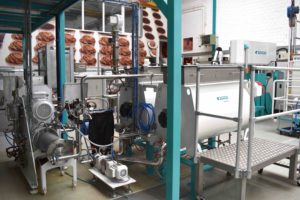Bühler’s major innovation campus taking shape in Switzerland

With work on Bühler’s CHF 50 million Cubic innovation campus under way, the company is hoping its strong emphasis on research and development will pay off. Neill Barston examines the plans and explores its bakery centre.
As company strategies go, ‘Innovating for a better world’ is a hugely bold statement of intent from Bühler.
The Swiss-based business certainly demonstrates no lack of ambition with such sentiments, yet it’s clear this is a philosophy that it intends to fully deliver upon.
This is confirmed by the sheer scale of its global operations, with a total of two billion people reached daily by the company’s products across its huge portfolio.
From its consumer food division of which chocolate processing and bakery systems play a notable part, through to animal feed, beverage industry and automotive aspects of the business, the scale of its interests is considerable.
There are now over 11,000 people employed across the company, operating in 140 countries around the world, with a total of 92 global service centres.
While the core of the business has traditionally been founded on its grain expertise, its expansion into consumer foods and technologically advanced processing equipment related to it, has found its services much in demand.
It has certainly expanded significantly since its original founding over 150 years ago, in 1860, as small family-owned company.
This seems ever more the case with a recent acquisition of the Austrian-based Haas group, which strengthens its confectionery equipment capabilities in particular through gaining mixing and wafer systems technology.
So, after receiving an invite to Bühler’s headquarters in the suburban town of Uzwil near the pristine city of Zurich, the company’s grand vision is taking shape before us.
This comes in the form of its recently announced CHF 50 million innovation centre, which is now in the initial stages of development and is expected to be fully operational by summer 2019.
It’s a facility that will certainly complement the existing sleek customer centre, which affords visitors a refined welcome, which sets-off the tone for the sense of quiet confidence appearing to flow readily from the employees we encounter within the company.
There seems a strong spark of inventiveness that the team includes an annual internal challenge to deliver new environmentally sustainable solutions within its range of equipment and processes.
According to the company’s chief technology officer (CTO), Ian Roberts, the move creating its innovation campus will represent a game-changing initiative that supports improvement of its existing research and development labs. These include facilities dedicated to chocolate confectionery, which the CTO believes will be critical in the company’s evolution.
Roberts says: “We’ve invested around the world for decades, and this recentres the heartbeat of innovation back in the home of the company, which is extremely important. Investing in a high-tech company and in Switzerland, which every year from the World Economic Forum is listed as number one for innovation.
“We will leverage the education system of the country within our environment, which is behind the apprenticeship opportunities and high-end academic capabilities it will offer,” enthuses the technology officer. He added that the business would work closely with start-up enterprises to further its own operations.
Meanwhile, in terms of the company’s technology development, he adds it has never been more important to integrate the skills and knowledge of experienced staff with younger generations who are perceived as ‘digital natives.’
“It’s a tremendous facility and It will be fully operational before next summer – we’re investing in innovation, building capability to have the best facilities to attract talent and build new businesses and improve the lives of our customers,” adds the CTO, who confirmed that its digital divisions, including prototyping work would operate from the new CUBIC building, which he anticipated would be fully operational before next summer.
Speaking on the company’s ambitious sustainability goals, he says consultation with many of its customers had led to the creation of a milestone goal of reducing energy consumption across all aspects of the business and equipment being developed by a margin of 30% by 2020.
He adds: “A third of the world’s energy goes into food manufacture – and a third of the world’s food is lost or wasted, and at the same time 800 million people are going hungry. How can we reconcile ourselves with this and build joint solutions?
“Well, we have committed with our industry partners to reduce energy consumption by 30%. You can argue if it’s possible, but with our customers we have joint accountability and it comes up with all our projects. That’s what we mean by Innovations for a better world. It’s not about making shiny signs, it’s about how much impact you can have on the environment.”

Industry 4.0
Regarding the introduction of greater integrated technology into its equipment ranges for ‘industry 4.0’ solutions for its systems including confectionery machinery, he said that the past year has brought considerable gains.
He was encouraged by the fact there had been significant progress over the past year in enhancing the digital capabilities across its equipment series, which is something the company has placed a major emphasis upon, and even created a new division for.
“We now have the capability to connect the vast majority of solutions we have through our global internet of things (IOT) platform, and we’re selling services with new business models that are purely digital, and we’re getting better at it.
“We have data analysts and scientists, and while progress is difficult to quantify, you can feel the transformation across the company,” explains the CTO, who says devising equipment that is easier for varying ability levels of operators to operate was of significant importance. So is creating data transparency with its equipment ranges in order for customers to fully optimise their production lines.
As his colleague Daniel Troxler, marketing director for consumer foods, explains, one of the most prominent systems within its present line-up for confectionery has been its DoMiReCo industry 4.0 solution.
He says its development reflected a wider demand for creating production line systems that maximise production lines, offering flexible and intuitive operation.
Mr Troxler says: “One of our main aims is to help customers to be more efficient. The quality of their products needs to be good, uptime needs to be longer, and traceability need to be 100%, which is what we are working on at the moment.
“The 4.0 dosing, mixing, refining and conching system (DoMiReCo) consists of four modules, two have been launched and two more at the end of the year – this is a self-optimising process which makes sure that production efficiency is going up and quality is on a high level with no fluctuations, as well as being efficient for energy requirements as well.
“Reducing the loss of raw materials is another target – these are the solutions we are developing, independent from raw material qualities, or from the mood or experience of the operator, so that the customer can increase efficiency for dosing, mixing refining and conching. Dosing quality is done on the two-roll and five-roll refiner, and we have optimised equipment which we believe prove to be game-changing.”
The marketing manager added that the company’s latest conching systems is also energy efficient, as well as having new ball mills for bread and nut spreads (the Nova S), which had in his opinion given the company a unique selling point on several key areas of machinery development.

Major acquisition move
On acquisition of the Haas group, he explained there had been understandable issues surrounding how the relationship would develop between the two businesses, but he explained the two companies were integrating step-by-step.
He said: “I am very optimistic about the move with Haas –
we have had our first orders from Haas customers, whom we had no previous contact with. This shows that with our network we can create the ability for people to do business with one supplier, which will help us with market success.
“Haas is a company with a long history with a lot of customers, and this has been one of its big successes, so we have to grow together.
Technology-wise, we are just starting to evaluate the possibilities we have together, but there are indeed many,” which he adds helps underline the company’s determination to be perceived as a one-stop shop handling everything from grinding, storing and processing to helping craft finished food products, including baking.
Research and development is clearly a priority, which is demonstrated as we tour its extensive test facilities.
Its chocolate production labs are particularly fascinating, with everything from mixing equipment through to refiners on site, in which customers are encouraged to work within them to identify potential products.

Bakery Innovation Centre (BIC)
Without doubt, one of the most impressive aspects of Uzwil’s headquarters is its Bakery Innovation Centre.
Initially opened in 2010, it has gradually evolved its capabilities into providing full training facilities and product development across the complete chain of grain to bread.
While others may well have training facilities, the company explains that its this extensive coverage of all aspects of grain production and processing that has helped made it stand out within the industry.
As Stefanie Hardtmann, bakery and training technology specialist, explains, the facility was devised as ‘a bridge between millers and bakers’ in which products can be discussed and processes given a thorough evaluation.
Its core facilities include a main auditorium for teaching and training by Bühler’s employees to provide specialist product handling and processing guidance.
There are now a total of over 200 bespoke courses being operated there including sponge and sourdough production, lab courses, general industrial production processes, as well as mechanical and electrical maintenance studies.
One of BIC’s key aspects is its dedication to plant and process optimisation, which has been developed around modular facilities that enable testing of everything from raw ingredients handling, through to final processing. This includes undertaking mixing trials and examining automation solutions – which are an ever-increasing component in the industry.
During my visit to the 1000 square metre facility, there were customer trials being conducted for it latest JetMix system create for producing homogeneous sponge and sour dough, which is increasingly used within industrial bakery.
According to the company, its key selling points include advanced microdosing technology that enables flour to be dosed with a particularly high level of accuracy. The company confirmed that nine such systems have successfully been installed in nine sites around the world.
Marco Lechner, bakery sales director, explains the BIC centre as a whole is proving a major success, and enabling customers to explore expanded product ranges including prototype systems and recipes.
“The reaction to bakery centre – the reaction to it has been extremely positive. It’s not only a question of people in the industry simply trying something, but it’s meant we have gained trust from customers, who are extremely interested in trying whatever they want to here.
“We can show them machinery and be hands-on with the equipment, and we can prove what we are selling actually works in terms of accuracy, which is important with mixing plants. Customers have been coming to our sourdough courses and have been very satisfied and they have had a good impact,” enthused the director on the company’s facilities, which are continuing to expand at a commendable level.
With major investment pouring into its headquarters, supported by a growing number of service centres around the world, the company is set to continue its drive for developing systems and solutions focused on delivering all-important efficiency and energy-reduction gains.
Bühler factfile
– Founded in 1860
– Present turnover of 2.67 billion CHF
– Employees (over 11,000 globally)
– Operates in 140 countries with 92 service centres
– The company has gained major market share in four sectors during its history, including 70% of chocolate being produced in its plants, with 4 million tons of cocoa beans harvested every year
– 30% of breakfast cereals are processed with Buhler’s technology, with 65% of the world’s grain using its machinery, and 75% of malt through its solutions



